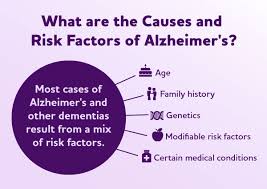Risk Factors of Alzheimer's Disease
Alzheimer's disease is influenced by a variety of factors that can increase the likelihood of developing the condition. While some factors, such as age and genetics, are beyond our control, understanding them can help in early detection and potential risk reduction.
Major Risk Factors
Below are some of the major risk factors associated with Alzheimer's Disease:
- Genetics: Individuals with a family history of Alzheimer's are at higher risk, especially if more than one family member was affected.
- Age: The risk of developing Alzheimer's increases significantly with age, particularly after the age of 65.
- Gender: Women are more likely than men to develop Alzheimer's, possibly due to their longer life expectancy.
Modifiable Risk Factors
Certain lifestyle and health factors can also play a role in the development of Alzheimer's. These modifiable risk factors include:
- Hypertension: High blood pressure has been linked to an increased risk of developing Alzheimer's.
- Diabetes: Managing diabetes effectively can reduce the risk of cognitive decline.
- Smoking: Smoking is a significant risk factor for both Alzheimer's and other forms of dementia.
- Sleep Disorders: Poor sleep patterns, especially sleep apnea, have been associated with higher Alzheimer's risk.
- Lack of Exercise: Regular physical activity is associated with a lower risk of cognitive decline and Alzheimer's.

It's important to note that while these factors can increase the risk, they do not guarantee the development of Alzheimer's. By understanding and managing the modifiable risk factors, it is possible to reduce the chances of cognitive decline.